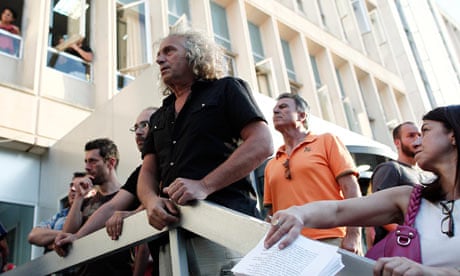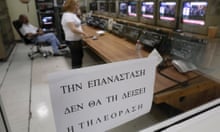Greek state TV and radio were gradually pulled off the air late on Tuesday, hours after the government said it would temporarily close all state-run broadcasts and lay off about 2,500 workers as part of a cost-cutting drive demanded by the bailed-out country's international creditors.
TV and radio stations of the Hellenic Broadcasting Corporation, or ERT, were pulled off the air in several parts of the country from about 11pm (9pm BST), about an hour before the government said all signals would go dead, although satellite broadcasts continued.
The conservative-led government said ERT would reopen "as soon as possible" with a new, smaller workforce. It wasn't immediately clear how long that would take, and whether all stations would reopen.
"Congratulations to the Greek government," newscaster Antonis Alafogiorgos said toward the end of ERT's main TV live broadcast. "This is a blow to democracy."
"I was hoping up until the last minute that the reports were not true. It's unbelievable," news reader Stavroula Christofilea said moments after the move was announced.
A Finance Ministry statement said ERT has been formally disbanded, and authorities would "secure" the corporation's facilities. Riot police deployed outside ERT buildings in several parts of Greece, but no clashes were reported.
Thousands of media workers and supporters protested against the closure outside the company's headquarters in the Athens suburb of Aghia Paraskevi. Unions representing ERT workers at three terrestrial TV stations, one satellite station and its national and regional radio network said they would keep the stations on air. Protesting employees were joined by opposition politicians and union leaders. Both minority government partners of the ruling conservative coalition condemned the suspension.
Government spokesman Simos Kedikoglou – a former state TV journalist – described ERT as a "haven of waste". He said its employees would be compensated.
Kedikoglou said in a televised statement aired on the state broadcaster: "At a time when the Greek people are enduring sacrifices, there is no room for delay, hesitation or tolerance for sacred cows.
"ERT is a typical example of unique lack of transparency and incredible waste. And that ends today," Kedikoglou said. "It costs three to seven times as much as other TV stations and four to six times the personnel – for a very small viewership, about half that of an average private station."
ERT has long been seen as a bastion of quality programming in a media landscape dominated by commercial stations. But it was also used by successive governments to provide safe jobs for political favourites, and, while nominally independent, devoted considerable time and effort to showcasing administration policies.
The broadcaster is largely state-funded, with every Greek household paying a fee through its electricity bills whether they have a TV set or not.
It is the first case of mass public sector layoffs in Greece , which has pledged to cut 15,000 state jobs by 2015 as part of its bailout commitments.
Debt-stifled Greece has depended on rescue loans from its European partners and the International Monetary Fund since May 2010. In exchange, it imposed deeply resented income cuts and tax hikes, which exacerbated a crippling recession and forced tens of thousands of businesses to close, sending unemployment to a record 27%.
Greece's POESY media union accused the government of sacrificing the broadcaster to appease its creditors.
"Bailout creditors are demanding civil service layoffs and the government, in order to meet its obligations toward foreign monitors, is prepared to sacrifice the public broadcasting corporation," a union statement said.








Comments (…)
Sign in or create your Guardian account to join the discussion